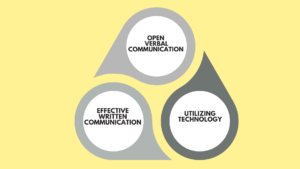In the fiercely competitive and demanding realm of law firms, achieving success hinges not only on legal expertise but also on clear and effective communication. Lawyers who possess exceptional communication skills are better equipped to forge connections with clients, build trust, retain business, and excel at networking and practice development endeavours. In this article, we will delve into the importance of efficient client communication by law firms and explore various approaches that can be adopted to foster effective communication.
1. Open verbal communication: Nurturing robust client connections, requires law firms to prioritize the establishment of transparent and welcoming communication channels. This entails fostering an environment that encourages clients to freely express their concerns, ask questions about pertinent matters and seek professional guidance. Some strategies to achieve this include:
- Listening In: When clients seek legal representation, they often bring forth intricate challenges intertwined with profound emotions. Attentive listening becomes paramount for lawyers as they strive to comprehend their clients’ concerns, objectives, and expectations. By actively listening, lawyers demonstrate empathy, foster trust, and gain a deeper understanding of their clients’ needs, enabling them to offer customised solutions.
- Accessibility: It is crucial for lawyers to be accessible to their clients. This can be achieved by promptly returning phone calls and emails, scheduling regular updates or meetings, and providing clients with alternative means of communication, such as online portals or video conferencing.
- Setting Expectations: At the onset of the client-lawyer relationship, it is vital to establish clear expectations regarding communication frequency, preferred methods, and response times. This helps manage client
expectations and avoids potential misunderstandings.
2. Effective written communication: In addition to verbal communication, law firms should prioritize clear and effective written communication. Written correspondence, such as emails, letters, and legal documents, play a significant role in client communication. Key considerations include:
- Keep it simple: While legal concepts are complex, lawyers should strive to articulate using simple but effective language . Avoiding jargon, explaining legal terms, and providing concise yet comprehensive explanations can enhance client comprehension.
- Timeliness and Responsiveness: Responding promptly to client inquiries or concerns, sometimes it maybe merely to acknowledge receipt, demonstrates professionalism and attentiveness. Clients appreciate timely updates on case progress, key deadlines, and any developments that may affect their legal matters.
- Document Organization: When sharing legal documents, lawyers should ensure they are well-organized, logically structured, and clearly labelled. Providing clients with indexed or summarized versions of lengthy documents can facilitate understanding and facilitate collaboration.
 3. Utilizing technology: Advancements in technology have significantly transformed client communication within law firms. Embracing technology can enhance efficiency, accessibility, and overall client experience. Consider
3. Utilizing technology: Advancements in technology have significantly transformed client communication within law firms. Embracing technology can enhance efficiency, accessibility, and overall client experience. Consider
the following:
- Client Relationship Management Systems: By utilizing CRM systems, law firms can effectively manage client interactions, maintain detailed client records, and access a centralized database that encompasses communication history, preferences, and case particulars. Leveraging CRM systems enables law firms to personalize client communications, anticipate their requirements, and deliver customized legal services, thereby enhancing client satisfaction and optimizing service delivery.
- Virtual Facetime: In an increasingly globalized world, remote communication has become essential. Virtual meetings and video conferencing tools facilitate real-time discussions, regardless of geographical constraints, ensuring efficient communication with clients in various locations.
- Document Management Systems: Implementing document management systems allows law firms to store, organize, and retrieve documents efficiently. This ensures that relevant information is readily accessible and enables collaborative document sharing with clients, promoting transparency and effective communication.